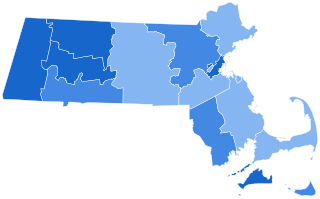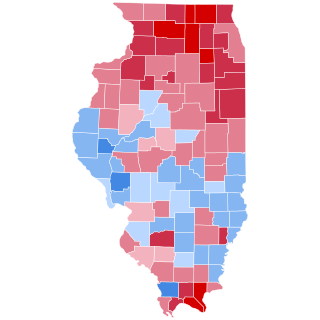
Super Tuesday is the United States presidential primary election day in February or March when the greatest number of U.S. states hold primary elections and caucuses. Approximately one-third of all delegates to the presidential nominating conventions can be won on Super Tuesday, more than on any other day. The results on Super Tuesday are therefore a strong indicator of the likely eventual presidential nominee of each political party.
The 2004 United States presidential election in Tennessee was held on November 2, 2004, and was part of the 2004 United States presidential election. Voters chose 11 representatives, or electors, to the Electoral College, who voted for president and vice president.

The 2008 Michigan Republican presidential primary took place on January 15, 2008. Mitt Romney came in first with 39 percent of the vote, followed by John McCain with 30 percent and Mike Huckabee in third-place with 16 percent. The victory was widely viewed as critical for the Romney campaign, as a loss in Michigan, where his father was governor, would have resulted in a loss of momentum after two losses already in New Hampshire and Iowa.

The 2008 Colorado Democratic presidential caucuses took place on Super Tuesday, February 5, 2008. As he did in every other state that held a caucus rather than a primary, Barack Obama won the caucus by a wide, two-to-one margin over Hillary Clinton.

The 2008 United States presidential election in Massachusetts took place, as in all 50 states and D.C., as part of the 2008 United States presidential election of November 4, 2008. Voters chose 12 representatives, or electors to the Electoral College, who, in turn, voted for the office of president and vice president.

The 2008 United States presidential election in Florida took place on November 4, as part of the 2008 United States presidential election. Florida voters chose 27 representatives, or electors to the Electoral College, who voted for president and vice president.

The 2000 United States presidential election in Rhode Island took place on November 7, 2000, and was part of the 2000 United States presidential election. Voters chose four representatives, or electors to the Electoral College, who voted for president and vice president.

The 2004 Maine Democratic presidential caucuses took place on February 8, 2004 as part of the 2004 United States Democratic presidential primaries. The delegate allocation is Proportional. the candidates are awarded delegates in proportion to the percentage of votes received and is open to registered Democrats only. A total of 24 delegates are awarded proportionally.

The 2004 Nevada Democratic presidential caucuses took place on February 14, 2004 as part of the 2004 United States Democratic presidential primaries. The delegate allocation is Proportional. The candidates were awarded delegates in proportion to the percentage of votes received and the caucus was open to registered Democrats only. A total of 20 delegates are awarded proportionally. A 15 percent threshold was required to receive delegates. Frontrunner John Kerry won the primary with Governor Howard Dean coming in a distant second. Kerry won the Democratic nomination for President of the United States, but lost the general election to incumbent George W. Bush.

The 2004 Wyoming Democratic presidential caucuses took place on February 3, 2004, as part of the 2004 Democratic Party presidential primaries. The delegate allocation is Proportional, the candidates are awarded delegates in proportion to the percentage of votes received.

The 2004 Maryland Democratic presidential primary took place on March 2, 2004 as part of the 2004 Democratic Party presidential primaries. The delegate allocation is proportional; candidates are awarded delegates in proportion to the percentage of votes received, open to registered Democrats only. Frontrunner John Kerry won the primary with former Senator John Edwards coming in a distant second.

The 2000 United States presidential election in Illinois took place on November 7, 2000, and was part of the 2000 United States presidential election. Voters chose 22 representatives, or electors to the Electoral College, who voted for president and vice president.

The 2000 United States presidential election in Tennessee was held on November 7, 2000, and was part of the 2000 United States presidential election. Voters chose 11 representatives, or electors, to the Electoral College, who voted for president and vice president.

The 2012 United States presidential election in Idaho took place on November 6, 2012, as part of the 2012 United States presidential election in which all 50 states plus the District of Columbia participated. Idaho voters chose four electors to represent them in the Electoral College via a popular vote pitting incumbent Democratic President Barack Obama and his running mate, Vice President Joe Biden, against Republican challenger and former Massachusetts Governor Mitt Romney and his running mate, Congressman Paul Ryan. Prior to the election, 17 news organizations considered this a state Romney would win, or otherwise considered as a safe red state. Romney and Ryan carried Idaho with 64.09% of the popular vote to Obama's and Biden's 32.40%, thus winning the state's four electoral votes. Romney's victory in Idaho made it his fourth strongest state in the 2012 election after Utah, Wyoming and Oklahoma. He improved on McCain's performance in 2008, expanding his margin from 25.3% to 31.69% and flipping Teton County which had previously voted for Obama.

The 2012 United States presidential election in Tennessee was held on November 6, 2012, as part of the 2012 United States presidential election in which all 50 states plus the District of Columbia participated. Tennessee voters chose 11 electors to represent them in the Electoral College via a popular vote pitting incumbent Democratic President Barack Obama and his running mate, Vice President Joe Biden, against Republican challenger and former Massachusetts Governor Mitt Romney and his running mate, Congressman Paul Ryan.

The 2012 United States presidential election in Texas took place on November 6, 2012, as part of the 2012 United States presidential election in which all 50 states plus the District of Columbia participated. Texas voters chose 38 electors to represent them in the Electoral College via a popular vote pitting incumbent Democratic President Barack Obama and his running mate, Vice President Joe Biden, against Republican challenger and former Massachusetts Governor Mitt Romney and his running mate, Congressman Paul Ryan.

The 1916 United States presidential election in Illinois was held on November 7, 1916, as part of the 1916 United States presidential election. State voters chose 29 electors to the Electoral College, who voted for president and vice president.

The 2020 United States presidential election in Tennessee was held on Tuesday, November 3, 2020, as part of the 2020 United States presidential election in which all 50 states plus the District of Columbia participated. Tennessee voters chose electors to represent them in the Electoral College via a popular vote, pitting the Republican Party's nominee, incumbent President Donald Trump, and running mate Vice President Mike Pence against Democratic Party nominee, former Vice President Joe Biden, and his running mate California Senator Kamala Harris. Tennessee has 11 electoral votes in the Electoral College.

The 2004 Georgia Democratic presidential primary was held on March 2 in the U.S. state of Georgia as one of the Democratic Party's statewide nomination contests ahead of the 2004 presidential election.

Tennessee state elections in 2004 were held on Tuesday, November 2, 2004. Primary elections for the United States Senate, United States House of Representatives, Tennessee Senate, and Tennessee House of Representatives, were held on August 5, 2004.


















